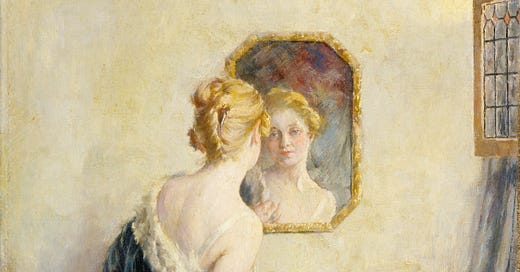Anyone who has ever taken it upon themselves to point out another’s blush must enjoy a similar satisfaction as one who stops a horde of charging firemen to warn them that they are, in fact, headed straight toward a burning building.
It is immensely difficult to exist within the constraints of the physical form. Sensitive people are reminded of this often. Our feelings are not only strong but voracious, insatiable and ever-growing, at war with the body, pleading for freedom beyond flesh. They do battle without my permission and even without my knowledge. I struggle to keep up with such subtle business. But my body has ways to remind me.
A long period of quiet social observation and subtle questioning has led me to believe that I experience myself to an abnormal degree. Whatever non-corporeal being exists deep inside me—the spirit, the soul, other theories of human consciousness—is beyond containment.
I leak out of myself constantly. I rattle; I shake; I sweat excessively; I talk too much; I can never come up for air (those who know me in person can attest to my frequent yawning1). My heart pounds. I drink decaffeinated coffee and herbal teas not to soothe or heal but to prevent further mayhem. I bite my nails down much too far, but I cannot stop and the pain is cruelty, crueler still at the fact that the pain is self-inflicted. I can hide most of these things, even my fingernails—I’ve been devouring myself for much too long to be self-conscious about it—but what I cannot suppress is blushing.
The most frustrating part of chronic blushing is all the spectacle it seems to encourage. We understand blushing to indicate particular emotions in context; most commonly romantic desire, embarrassment, or both. If I could color-code my blushing, I certainly would, but until such technologies develop, I remain frustrated by external interpretations that make various conclusions about my emotional state without my input.
The fact is that the flush and burn of my skin does not necessarily indicate embarassment or attraction (although, of course, it can and it has). For me, blushing is a mere consequence of living. To speak is to light a pink-hot flame. And to joke or laugh or feel anything other than bland contentment is a sentence to the stake. Knowing this is enough for myself—but what of my powerlessness to the reactions of others?
Blushing betrays the gentle beauty of the human experience. No wonder it is such a source of shame; so many external stimuli are designed to do the opposite, to pull us away from ourselves and encourage thoughtlessness, mindless consumption, inconsiderate professionalism, detached coolness. Blushing interrupts the rehearsal of every single social performance. The altering of the outer appearance (which is in my case a great alteration: not only my cheeks but my entire face) is too disruptive not to point out and say: you are vulnerable; this is abnormal.
As the world pushes us further away from each other, we are increasingly uncomfortable with people living at different emotional intensities. We make little effort to sympathize or marvel with sparkling eyes at our differences or, God forbid, reflect and understand. Blushing reminds me to make this effort because I have no choice but to broadcast my social vulnerability right on my skin.
Having established its beauty, I still face the challenge of misunderstanding. There is something alluring about living a quiet, contemplative existence whilst unfettered emotion tries at every turn to burst out from your insides. Perhaps this is why others feel the need to comment when the situation makes itself apparent. Isn’t is quite fascinating to believe, even if for a moment and even if false, that you have visual confirmation of another’s thoughts? We cannot comprehend the people around us, but how often do we wish that we could? If my blushing is a taste of a softer, gentler, more understanding world, who am I to stop another from acknowledging it?
I often talk so much because I am afraid that others will make incorrect assumptions about me if they don’t hear my thoughts on any particular topic from beginning to end. Such is the stress of any social situation—and, of course, the stress of writing for an audience. Words can only say so much; they are meant for interpretation.
As I transition out of graduate school and into the uncertain, I remind myself that external perceptions are not poison but a natural result of living, no more consequential than blushing or sweating or breathing just a little harder after a walk up the stairs.
I sat down to write this entry with a purely sardonic intent. I thought I’d say something to shame and possibly even silence those who feel the need to comment on another’s embarrassment.2 But the precise beauty of writing is that it teaches—and in the process of drafting this post, I uncovered my true feelings about my fear of misguided reactions to severe blushing.
To those who notice the blush on someone’s face and feel compelled to comment—yes, we know. Yes, it burns. No, I do not have a crush on my classmate; I am not afraid of public speaking3; I am not prudish; I am not humiliated; but I cannot stop your assumptions when my redness is so poorly timed, so make them as you will. And, most importantly, I empathize with your curiosity. Who wouldn’t?
As my twenty-fifth birthday looms in the coming seasons, I’m learning that it is most important for me to know myself. That is all I can control. And so I say: I embrace your fictions. Make them good. Let them tell a tale.
I wholeheartedly believe I will be gasping for air until my very last breath.
Though I cannot help but wonder if people are no longer being raised with the “if they can’t fix it in five minutes, don’t point it out” rule. Fly down? Lipstick smudged? Tell them. Blushing? Sweat stains? Dandruff? Don’t. (Though maybe the only exception to this is pointing out period stains. Girls, always help each other.)
For all my anxiety, I truly am not afraid. Give me the floor.







